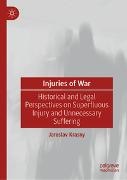Read more
The book examines the central reasons behind the divergent interpretations of the principle of the law of armed conflict prohibiting superfluous injury or unnecessary suffering. It explores the codification process of the law of armed conflict, historical landmarks pertaining to the deployment of specific weapons, and case law. The author contends that, whereas military necessity was previously the balancing principle for interpreting the norm prohibiting unnecessary suffering, this balancing factor has shifted to place a greater emphasis on health effects. In addition to examining whether the principle may be interpreted in medical terms, the book includes medical data to support such an argument. While controversy remains regarding particular weapons and their correlation with the unnecessary suffering principle, long-term health effects of individual weapons, most notably nuclear weapons, are being recognized through jurisprudence as particular cause of superfluous injury or unnecessary suffering. Such recognition is due to their unceasing, continuous detrimental effect on human health and quality of life even after the end of an armed conflict. The author argues that weapons causing unending long-term harmful effects on human body are in fact violating the principle prohibiting superfluous injury or unnecessary suffering by violating the temporal application of the law of armed conflict. As a result, the principle is increasingly interpreted by judicial bodies in medical terms, as opposed to military necessity alone. The book aims to clarify the changing nature of this basic principle of weapons law, improve its clarity and overall comprehension of the concept as particularly unnecessary suffering and superfluous injury is often brought up during disarmament conferences and weapons treaty negotiations at international bodies.
Dr. Jaroslav Krasny is a professor at Nagasaki University, Research Center for Nuclear Weapons Abolition (RECNA). He previously worked at the United Nations Institute for Disarmament Research (UNIDIR) in the Weapons of Mass Destruction (WMD) Programme.
List of contents
Chapter 1: The Origins and Evolution of Weapons Law.- Chapter 2: Traditional Interpretation.- Chapter 3: Health Effects-Based Interpretation.- Chapter 4: Weapons Use and Health Effects.- Chapter 5: Unnecessary Suffering in Contemporary Legal Framework.- Chapter 6: The Law in Practice.- Chapter 7: Challenges and Future Technology.
About the author
Dr. Jaroslav Krasny is a professor at Nagasaki University, Research Center for Nuclear Weapons Abolition (RECNA). He previously worked at the United Nations Institute for Disarmament Research (UNIDIR) in the Weapons of Mass Destruction (WMD) Programme.
Summary
The book examines the central reasons behind the divergent interpretations of the principle of the law of armed conflict prohibiting superfluous injury or unnecessary suffering. It explores the codification process of the law of armed conflict, historical landmarks pertaining to the deployment of specific weapons, and case law. The author contends that, whereas military necessity was previously the balancing principle for interpreting the norm prohibiting unnecessary suffering, this balancing factor has shifted to place a greater emphasis on health effects. In addition to examining whether the principle may be interpreted in medical terms, the book includes medical data to support such an argument. While controversy remains regarding particular weapons and their correlation with the unnecessary suffering principle, long-term health effects of individual weapons, most notably nuclear weapons, are being recognized through jurisprudence as particular cause of superfluous injury or unnecessary suffering. Such recognition is due to their unceasing, continuous detrimental effect on human health and quality of life even after the end of an armed conflict. The author argues that weapons causing unending long-term harmful effects on human body are in fact violating the principle prohibiting superfluous injury or unnecessary suffering by violating the temporal application of the law of armed conflict. As a result, the principle is increasingly interpreted by judicial bodies in medical terms, as opposed to military necessity alone. The book aims to clarify the changing nature of this basic principle of weapons law, improve its clarity and overall comprehension of the concept as particularly unnecessary suffering and superfluous injury is often brought up during disarmament conferences and weapons treaty negotiations at international bodies.

